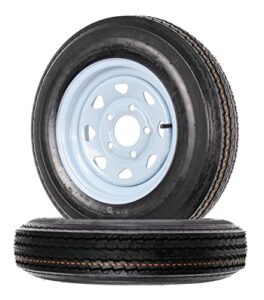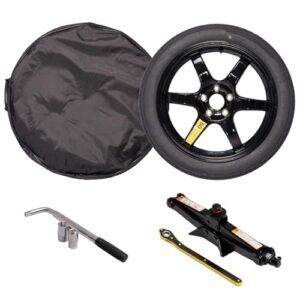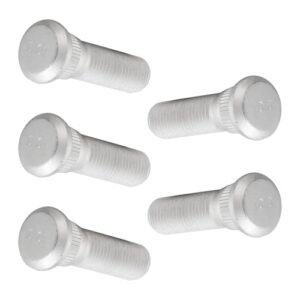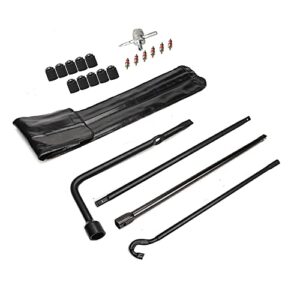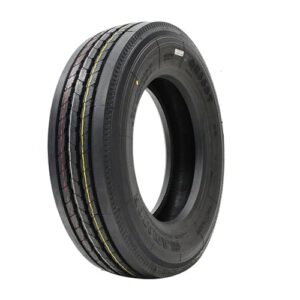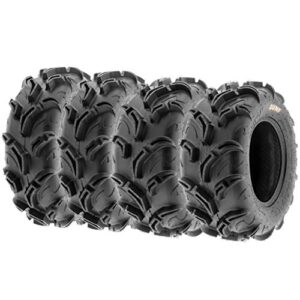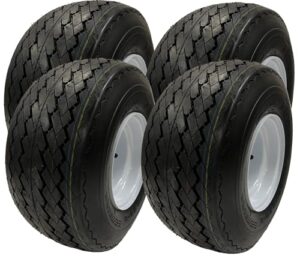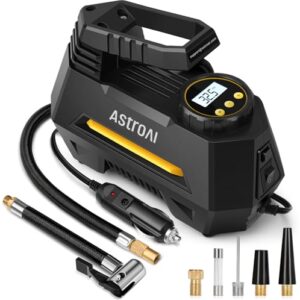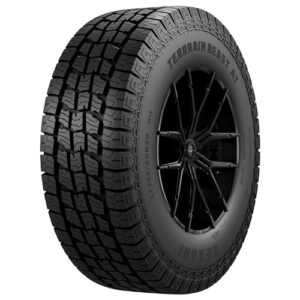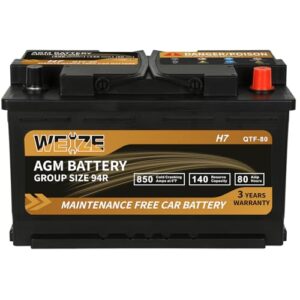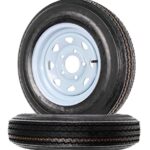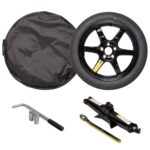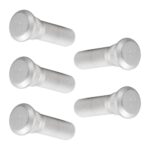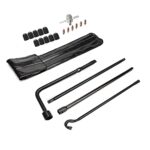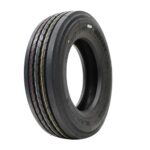To choose tires for commercial vehicles, consider load capacity, durability, and tread design. Evaluate driving conditions and budget constraints.
Choosing the right tires for commercial vehicles is crucial for safety and efficiency. Tires directly impact fuel economy, handling, and overall vehicle performance. Commercial vehicles often carry heavy loads and travel long distances, so durable and reliable tires are essential.
It’s important to select tires with the appropriate load rating and tread design for your specific driving conditions. Additionally, investing in quality tires can reduce maintenance costs and downtime, ultimately saving money in the long run. Prioritize reputable brands and consult with professionals to ensure you make the best choice for your fleet.
Importance Of Right Tires
Choosing the right tires for commercial vehicles is crucial. The correct tires ensure safety, fuel efficiency, and long-term savings. This section discusses the importance of selecting the right tires.
Safety Considerations
Safety is the top priority when selecting tires. Proper tires provide better grip, especially in wet conditions. This reduces the risk of accidents. Tires with adequate tread depth also increase braking performance. It ensures the vehicle stops in shorter distances. Additionally, tires must be durable. They need to withstand heavy loads without bursting.
Fuel Efficiency
Right tires can significantly improve fuel efficiency. Low rolling resistance tires reduce the energy needed for motion. This translates into lower fuel consumption. Over time, this can save a lot of money. Consider the tire’s design and material. These factors play a role in fuel efficiency. Regularly check tire pressure. Proper inflation maintains fuel efficiency and extends tire life.
Types Of Commercial Vehicle Tires
Choosing the right tires for commercial vehicles is crucial. Different types of tires offer various benefits. Understanding these types helps in making an informed decision. Below are the main types of commercial vehicle tires.
All-season Tires
All-season tires are versatile and can be used year-round. They perform well in wet and dry conditions. These tires offer a balanced performance. They are suitable for mild winters and summer. All-season tires have moderate tread depth. This design helps in providing a smooth ride. They are cost-effective and low-maintenance.
- Good for year-round use
- Perform well in wet and dry conditions
- Moderate tread depth
- Cost-effective
Winter Tires
Winter tires are designed for cold weather. They have deeper treads and softer rubber. This design helps in gripping icy and snowy roads. Winter tires are essential for regions with heavy snowfall. They improve safety and performance in winter. These tires are not suitable for summer. They wear out quickly in warm weather.
- Designed for cold weather
- Deeper treads and softer rubber
- Improved grip on icy roads
- Essential for heavy snowfall regions
- Not suitable for summer
Key Factors To Consider
Choosing the right tires for commercial vehicles is crucial. It affects safety, efficiency, and cost. Here are some key factors to consider when selecting commercial vehicle tires.
Load Capacity
Load capacity is a critical factor. Tires must support the vehicle’s weight and cargo. Check the tire’s load index rating. This indicates how much weight the tire can handle.
Use the table below for reference:
| Load Index | Weight Capacity (kg) |
|---|---|
| 85 | 515 kg |
| 100 | 800 kg |
| 120 | 1400 kg |
Ensure your tires match or exceed the vehicle’s load requirements. Always check the manufacturer’s specifications for accurate information.
Tread Design
Tread design impacts traction and wear. Different designs suit various driving conditions. Here are some common tread designs:
- Ribbed Tread: Good for highway driving and fuel efficiency.
- Lug Tread: Offers better traction on rough or muddy terrain.
- Block Tread: Balances traction and durability for mixed conditions.
Choose the tread design based on your driving conditions. Consider the climate and road surfaces you encounter.

Tire Size And Specifications
Choosing the right tires for commercial vehicles is crucial. Tire size and specifications affect performance, safety, and fuel efficiency. Understanding these factors ensures optimal vehicle operation.
Reading Tire Codes
Tire codes are a sequence of letters and numbers. These codes reveal important information about the tire.
The code typically looks like this: P215/65R15 95H. Each part of the code has a specific meaning:
| Code | Meaning |
|---|---|
| P | Type of vehicle (Passenger) |
| 215 | Tire width in millimeters |
| 65 | Aspect ratio (height to width) |
| R | Radial construction |
| 15 | Wheel diameter in inches |
| 95 | Load index (weight capacity) |
| H | Speed rating |
Matching Vehicle Requirements
Always match the tire size to the vehicle’s requirements. Consult the vehicle’s manual for the correct specifications.
- Check the load index. Ensure it meets the vehicle’s weight needs.
- Verify the speed rating. It should match the vehicle’s top speed.
- Ensure the tire width fits the vehicle’s design.
- Confirm the wheel diameter matches the wheels.
Using the wrong size can lead to poor performance and safety risks. Always double-check the specifications before purchasing tires.
Durability And Longevity
Choosing the right tires for your commercial vehicles is crucial. Durability and longevity are two key factors. Durable tires last longer and save money. They also ensure safety on the road. Below, we explore material quality and maintenance tips.
Material Quality
The quality of the tire material matters a lot. High-quality rubber offers better durability. It can withstand harsh road conditions. Look for tires with strong tread patterns. These provide better grip and last longer.
- Check for reinforced sidewalls.
- Opt for tires with high resistance to wear.
- Select tires with good heat dissipation.
Maintenance Tips
Maintaining your tires well can extend their lifespan. Regular checks can prevent unexpected issues. Here are some simple tips:
- Check tire pressure monthly.
- Rotate tires every 6,000 miles.
- Inspect tread depth regularly.
- Align wheels twice a year.
- Balance tires when needed.
Following these tips helps in achieving maximum durability. Well-maintained tires perform better and ensure safety. Make tire maintenance a priority for your commercial vehicles.

Cost Vs. Performance
Choosing the right tires for commercial vehicles involves balancing cost and performance. It’s essential to consider both to ensure safety and efficiency.
Budgeting For Tires
Setting a budget for tires is crucial. Tires can vary in price significantly. Higher-end tires often offer better performance. But they come at a higher cost. It’s important to determine how much you are willing to spend. This helps narrow down your options.
Here’s a simple table to guide your budgeting:
| Type of Tire | Price Range |
|---|---|
| Economy Tires | $100 – $200 |
| Mid-Range Tires | $200 – $400 |
| Premium Tires | $400 – $800 |
Consider how often you will replace the tires. Frequent replacements can offset initial savings. Keep this in mind while budgeting.
Evaluating Value
Evaluating the value of tires involves more than just cost. Look at the performance features of each tire. These include:
- Durability: How long will the tires last?
- Fuel Efficiency: Do the tires help save on fuel?
- Traction: How well do the tires grip the road?
- Load Capacity: Can the tires handle the vehicle’s weight?
Consider these factors when evaluating the value of tires:
- Read reviews from other commercial vehicle owners.
- Consult with tire experts for recommendations.
- Compare the features and prices of different brands.
Remember, the cheapest option may not always be the best. Look for a balance between cost and performance. This ensures you get the best value for your money.
Seasonal Considerations
Choosing the right tires for commercial vehicles depends on many factors. One of the most critical factors is the season. Different seasons affect tire performance in unique ways. Knowing how to choose the right tires for each season can ensure safety and efficiency.
Climate Impact
Climate plays a significant role in tire selection. In winter, roads are often icy and snowy. Tires with deep treads and softer rubber perform better. They provide better grip and traction in snowy conditions. In summer, the roads are hot and dry. Tires with harder rubber compounds are preferable. They resist wear and offer better fuel efficiency.
Regional Variations
Different regions experience different weather patterns. Coastal areas often have milder winters but wetter conditions. Inland regions may face extreme temperatures in both summer and winter. Mountainous areas deal with frequent snow and ice. Choose tires that match the weather conditions of the region.
Here is a quick reference table for regional tire selection:
| Region | Preferred Tire Type |
|---|---|
| Coastal | All-Season Tires |
| Inland | Winter Tires (Winter), Summer Tires (Summer) |
| Mountainous | Winter Tires |
Consider both climate and region for optimal tire performance. This ensures safety and efficiency for your commercial vehicles.

Expert Recommendations
Choosing the right tires for commercial vehicles requires expert recommendations. Proper tire selection can save costs and ensure safety. Below, we explore top brands and professional advice for choosing commercial vehicle tires.
Top Brands
Several brands stand out in the commercial tire market. These brands offer durability, performance, and value.
- Michelin: Known for durability and fuel efficiency.
- Goodyear: Offers a wide range of commercial tires for various needs.
- Bridgestone: Renowned for advanced technology and long-lasting tread life.
- Continental: Provides excellent traction and load capacity.
- Pirelli: Focuses on high-performance and safety features.
Professional Advice
Experts recommend considering several factors before choosing commercial vehicle tires. These factors ensure you make the best decision for your needs.
| Factor | Description |
|---|---|
| Load Capacity | Ensure the tire can handle the vehicle’s weight and cargo. |
| Durability | Choose tires that last long and withstand rough conditions. |
| Fuel Efficiency | Opt for tires that improve fuel economy and save costs. |
| Traction | Good traction ensures safety in various weather conditions. |
- Consult with tire experts. They can provide tailored recommendations.
- Assess your driving conditions. Consider weather and road types.
- Review tire warranties. Ensure your investment is protected.
Following expert recommendations helps in choosing the right tires. This ensures safety, performance, and cost-efficiency for your commercial vehicles.
Frequently Asked Questions
What Is The Difference Between Commercial Tires And Regular Tires?
Commercial tires are designed for heavy loads and frequent use. Regular tires are made for standard passenger vehicles. Commercial tires offer durability and improved traction for long distances. Regular tires prioritize comfort and everyday driving performance.
What Makes A Tire Commercial Grade?
A tire qualifies as commercial grade through its durability, load capacity, and design for heavy-duty usage. It resists wear, supports substantial weight, and ensures safety.
How To Choose Semi-truck Tires?
Choose semi-truck tires based on load capacity, tread design, durability, weather conditions, and fuel efficiency. Consult manufacturer guidelines.
How To Read A Commercial Tire?
To read a commercial tire, check the sidewall for size, load index, speed rating, and ply rating. Decode the alphanumeric code.
Conclusion
Choosing the right tires for commercial vehicles ensures safety and efficiency. Consider load capacity, terrain, and weather conditions. Regular maintenance extends tire life. Make informed decisions to keep your fleet running smoothly. Proper tire selection and care can save money and increase performance.
Invest in quality tires for better reliability and safety.




